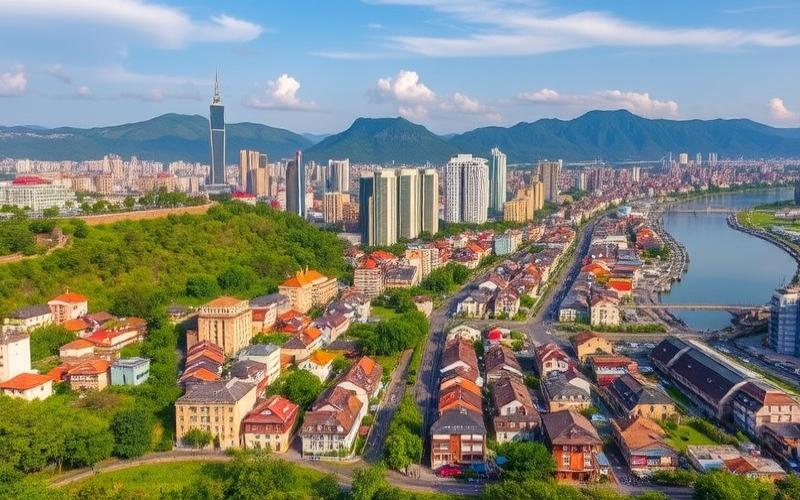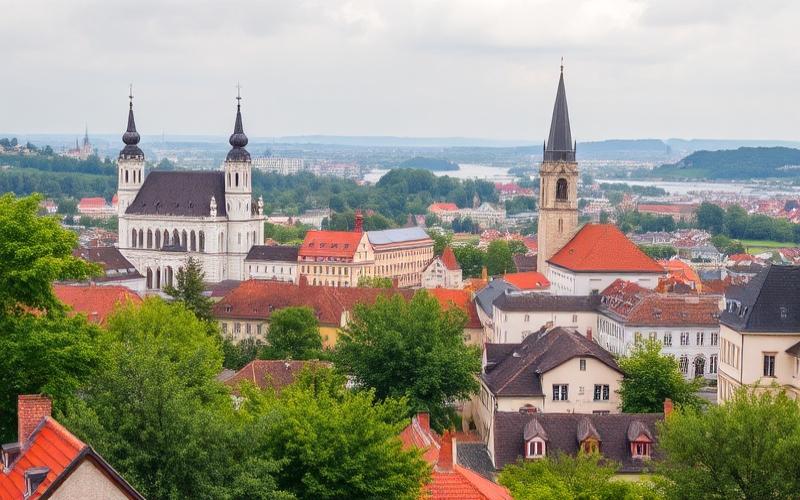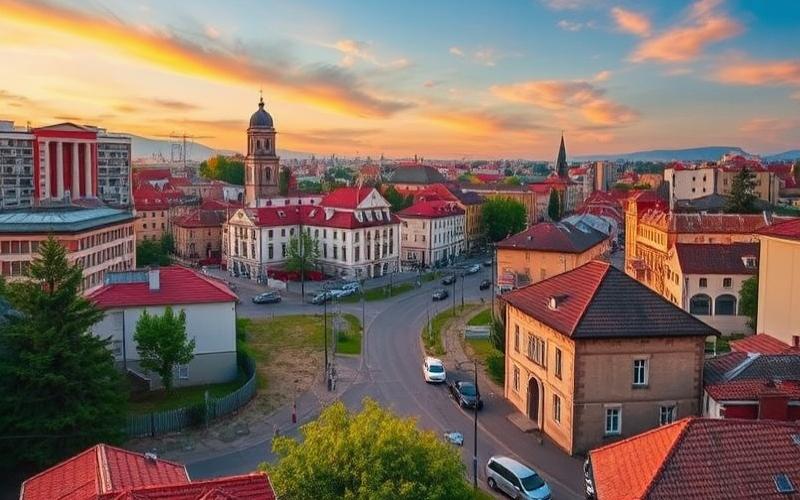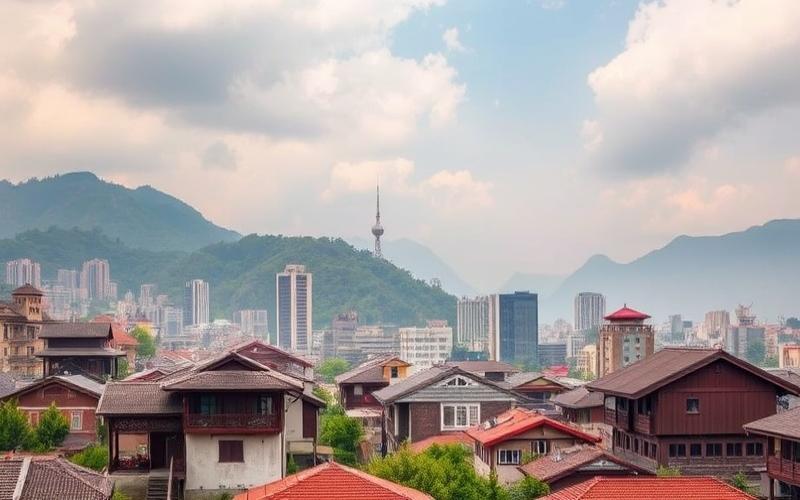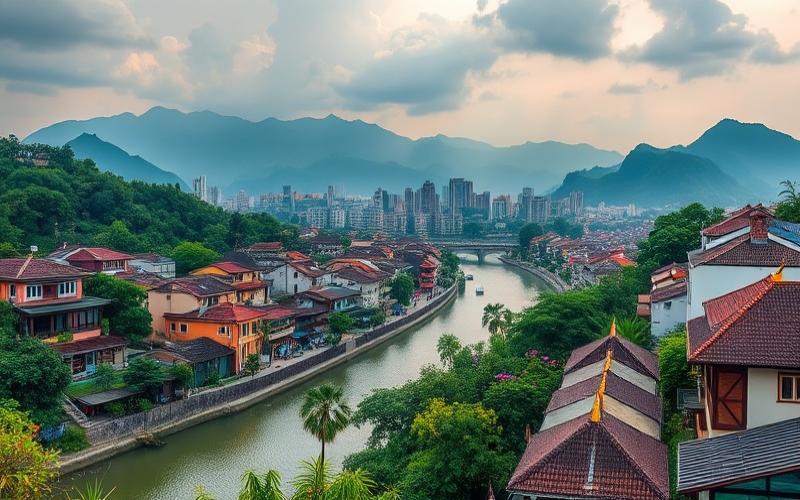
 Published on and written by Cyril Jarnias
Published on and written by Cyril Jarnias
Exploring the Captivating Stories of French People Living in Hungary
A country with rich cultural and historical heritage offers fascinating insight into their quest for new opportunities and life changes. This article brings together the unique testimonies of those who chose to settle in this Central European country, while becoming real estate owners.
Through their experiences, discover the motivations behind this bold choice, the challenges encountered, and the joys of integrating into a distinct culture. These expatriates’ stories reveal how purchasing a house or apartment in Budapest or its surroundings can transform a simple stay into a deeply enriching adventure.
Journeys of French Expatriates in Hungary: Their Authentic Stories
Many French expatriates settled in Hungary share authentic experiences filled with discoveries, adaptation, and personal transformation. Their journeys are characterized by diverse motivations, gradual integration, and vibrant contributions to the local cultural landscape.
Motivations for Expatriation:
- Seeking a cheaper and more comfortable life.
- Desire to discover another European culture.
- Professional opportunities or willingness to follow a spouse.
- Wanting to offer their children exposure to the world.
Challenges Encountered:
- Language barrier: Hungarian is known to be difficult to learn; many communicate in English or with the French community initially.
- Difficulty building connections with locals, often perceived as reserved or shy.
- Feeling of distance from loved ones back in France, especially during important family events or traditional holidays.
- Food adaptation: sometimes frustrating not to find French products (red meat, milk chocolate…).
| Challenge | Concrete Testimony | Impact on Daily Life |
|---|---|---|
| Language | “I had some basics but it didn’t change anything…” | Limits spontaneous exchanges |
| Social Life | “The expat community offers moral support and advice” | Facilitates integration |
| Food Products | “Hard to find certain French foods” | Homesickness |
Positive Surprises:
- Ease of living without speaking perfect Hungarian (services accessible in English).
- Appreciated quality of life for its affordable cost and urban beauty (Budapest very green, numerous parks).
- Accessible local cultural richness through festivals, museums, and markets that become preferred immersion spots.
Concrete Examples of Integration & Cultural Contribution:
A French mother who became president of a local association welcomes new expatriates and runs cooking workshops for French-speaking children. Her involvement in the French school strengthens her place in the local educational community.
“I’ve done a lot since my arrival: updated local guide, association activities…”
A family shares their evenings at Hungarian thermal baths with their local neighbors; their son born in Hungary symbolizes their gradual rooting in the country.
“Walks along the Danube have become our precious moments…”
Impact of Real Estate Choice on Immersion:
Buying property was often felt as a foundational act for the sense of belonging:
- Becoming an owner involves demanding administrative procedures but allows expatriates to:
- Invest sustainably in their neighborhood
- Build stable relationships with neighbors
- Be perceived as active members by the local population
Memorable Anecdotes:
A couple recounts that their move sparked the neighborhood’s benevolent curiosity, with neighbors spontaneously introducing themselves to offer logistical help—a gesture they say is rare elsewhere.
When renovating their typical Art Deco Budapest apartment, they received valuable advice from Hungarian craftsmen; this facilitated informal language learning (“You learn fast when you have to choose tiles!”).
Daily Life & Local Interactions:
- Shopping at the central market where vendors kindly introduce local specialties
- Regular participation in national holidays (St. Stephen’s Day) inviting sharing of culinary traditions
- Sports activities where instructors willingly adapt classes to include French speakers
For many,
the decision to become a homeowner accelerates
social integration while consolidating
the feeling of “being at home”—right here,
in the heart of Budapest.
These stories reveal that while the path to integration involves obstacles and nostalgia,
it also opens up to enriching encounters, a broader worldview,
and a deep attachment to this new European home.
Good to Know:
Many French expatriates find in Hungary not only a new home but also fertile ground for cultural and professional opportunities. Attracted by the affordable cost of living and enriching quality of life, they share stories where language barriers and administrative complexities are just challenges among others. Gérard, for example, tells how becoming a property owner in Budapest opened doors to local trust, fostering connections with his neighbors and closer immersion. Lisa, meanwhile, was surprised by the richness of Hungarian culture, both in culinary traditions and flourishing art, which fueled her passion for cultural exchanges. These authentic stories also testify to the warm welcome from Hungarians, facilitating smooth integration and often unexpected but fruitful collaborations in fields ranging from education to entrepreneurship. These experiences of daily life and established properties represent much more than a simple change of residence; they embody a genuine shift in perspective and open previously unforeseen horizons.
Investing in Real Estate: French Success Stories in Hungary
Concrete Examples of French People Who Succeeded in Hungarian Real Estate
| Investor | Property Type | Key Investment Steps | Challenges Encountered | Opportunities and Benefits |
|---|---|---|---|---|
| Sébastien (real case) | Entire building in Budapest (Paulay Ede utca neighborhood) | Property search, purchase, complete renovation, rental management | Airbnb restrictions, need for major renovation, specific legislation | Full building control, value appreciation, high rental income, protection against Airbnb restrictions |
| Anonymous investors (statistics) | Apartments in central districts (V, VI, VII districts) | Purchase between 2014-2018, rental setup, resale after 5 years | Strong competition for attractive properties, adaptation to local taxation | Annual appreciation up to 15-20%, capital gains exemption after 5 years, rental profitability higher than France |
Reasons Driving French People to Invest in Hungary
- Attractive Purchase Prices: Budapest remains much cheaper than Western European capitals, with prices below €3,000/m² even in sought-after neighborhoods.
- Rapid Market Growth: Price increases of 12-15% annually during certain periods, making investment particularly profitable.
- Advantageous Taxation: Capital gains exemption after 5 years of ownership, 15% flat tax on rental income.
- Tourism Potential: Strong demand for short and medium-term rentals, despite Airbnb restrictions.
- Quality of Life and Integration: Low cost of living, Budapest’s dynamism, developed French expatriate network.
Key Steps for Investment in Hungary
- Property Search (via agencies, local contacts, on-site visits).
- Financing: Using a French mortgage loan (secured on property in France), as non-residents cannot obtain local loans.
- Legal Assistance: Mandatory use of specialized lawyer for transaction, registration with Hungarian land registry.
- Potential Renovations: Renovation for property valuation, adaptation to rental standards.
- Rental Setup or direct/indirect rental management.
- Tax and Administrative Management: Monitoring local and French tax obligations, income and capital gains declarations.
Challenges Encountered
- Language Barrier: Complexity of procedures, need for interpreter.
- Legal Specificities: Different contract types (e.g., LOTVA clause), local taxation to understand well.
- Evolving Regulations: Restrictions on short-term rentals (Airbnb).
- Increased Competition: More and more foreign investors in the market.
Benefits Gained from Investment
- Significant Capital Gains upon resale after a few years.
- High Rental Yields (higher than in France).
- Protection Against Inflation and asset diversification.
- Better Integration through property management on site, creating ties with local and expatriate community.
- Enhanced Quality of Life for those choosing to settle or stay regularly in Budapest.
- Get Assisted by a Local Lawyer: essential to secure transaction and understand legal specificities.
- Take Time to Visit Multiple Properties: market is heterogeneous, quality varies greatly by neighborhood and buildings.
- Anticipate Taxation: properly prepare financial and tax structure, consider capital gains rules and rental income taxation.
- Prioritize Central Neighborhoods for renting to expatriates or tourists, but monitor Airbnb regulations.
- Budget for Renovation: older apartments often require work, but added value can be significant.
- Maintain Local Network: facilitates remote management and access to good opportunities.
- Stay Informed Regularly about country’s regulatory, tax, and economic developments.
The real estate success stories of French people in Hungary rely on meticulous preparation, deep understanding of the local market, and ability to overcome legal and administrative challenges. The Hungarian market offers attractive profitability and real capital gains opportunities, provided one acts rigorously and is well-supported.
Good to Know:
Several French people have found success investing in Hungarian real estate, like Martin who bought apartments in Budapest, appreciating their appreciation potential and attractive rents thanks to the flourishing tourist market. He started with thorough market and local law research, recommending hiring a Hungarian lawyer to avoid legal pitfalls. Another example is Sophie, choosing to invest in buildings to renovate at advantageous prices on city outskirts, transforming them into modern and profitable rental properties. Challenges include mastering the language and navigating a different tax system, though benefits such as stable returns and asset diversification make it worthwhile. These investors emphasize the importance of connecting with the local community to better understand the market and foster their integration in Hungary, offering advice like the necessity of surrounding oneself with a competent local team.
Living in Hungary: French Expatriates’ Opinions and Experiences
Hungary attracts many French expatriates, drawn by reduced cost of living, advantageous taxation, and rich culture. Here’s a structured overview of main aspects of Hungarian life from expatriates’ perspective, particularly property owners.
Main Assets and General Impressions:
- Lower Cost of Living: Cost of living is about 37% lower than in France, allowing expatriates to enjoy better purchasing power for food, outings, and transportation.
- Attractive Taxation: Income tax is 15%, much lower than France. This motivates many workers or retirees to settle long-term.
- Quality of Life: Healthcare meeting European standards, facilitated banking access, cultural diversity, architecture, and vibrant nightlife.
- Present French Community: Several hundred families, associations, events (evenings, support groups) facilitate integration.
Cultural Differences and Adaptation:
Interactions with Locals: Hungarians are often perceived as more reserved and less demonstrative than French people. The language barrier sometimes accentuates this distance, even though English is widely used in services and among youth.
Testimony: “Hungarians are quite shy and with the language barrier it doesn’t help communication. Their English is average, which limits exchanges.”
Daily Adaptation: It’s possible to live in Budapest without mastering Hungarian, thanks to common use of English in daily life (banks, pharmacies, gyms).
Testimony: “I’m amazed by the ease of living here without speaking the language. I can do everything in English, banking, pharmacy…”
Positive Points According to Expatriate Property Owners:
- Attractive Real Estate Market: Purchase prices are significantly lower than France, especially in Budapest and large cities, even though foreign demand drives up rents in some central neighborhoods.
- Ease of Property Access: Foreigners can buy real estate with few restrictions except agricultural land.
- Rental Investment: Expatriate owners note strong rental demand, particularly from other expatriates and students.
Difficulties Encountered:
- Integration: Hungarian reserve, language barrier, and strong attachment to their culture can hinder deep connection building.
- Social Jealousy: Some expatriates feel a form of jealousy or distrust, with foreigners sometimes perceived as responsible for rising downtown property prices.
- Difficulty Accessing Certain French Products: French food products in particular can be hard to find or expensive.
- Climate: Cold winters, weather sometimes heavy for French people accustomed to milder winters.
| Aspect | Positive Points | Negative Points |
| Cost of Living | Very affordable, high purchasing power | Low local salaries |
| Real Estate Market | Attractive prices, facilitated access for foreigners | Rising downtown rents |
| Local Culture | Historical richness, authenticity | Hungarian reserve, slow adaptation |
| French Community | Active networks, mutual aid, events | Risk of remaining “among French” |
| Integration | Ease with English in large cities | Language barrier, limited integration |
| Quality of Life | Health, leisure, security | Lack of French products, weather |
Motivations for Settling:
- Escape French Tax Pressure
- Seek Better Quality of Life at Lower Cost
- Invest in Rental Real Estate
- Enjoy International and Dynamic Environment
Integration Challenges and Cultural Impact:
- Language: Hungarian is known to be difficult. Few expatriates truly learn it, but English remains sufficient in urban life.
- Cultural Impact: Cultural shock is real but mitigated by strong expatriate community presence and Budapest’s openness.
- Gateway to Central Europe: Expatriates appreciate central geographical location, allowing easy travel in the region.
Life in Hungary offers real advantages for French expatriates, but full integration requires effort, particularly linguistically and socially.
Good to Know:
French expatriates living in Hungary often highlight the country’s cultural richness distinguished by its musical tradition and thermal baths, offering a pleasant living environment different from France. The French community is constantly evolving, providing good support and exchange networks, sometimes facilitating new arrivals’ integration. However, learning Hungarian is a major challenge, especially since interactions can be limited by this language barrier, though many Hungarians speak English. Expatriate property owners mention the relative accessibility of the real estate market, though some administrative procedures can be complex. Settling in Hungary appeals due to its affordable cost of living and quality of public services, but requires some adaptation in terms of mentalities and local pace of life.
Disclaimer: The information provided on this website is for informational purposes only and does not constitute financial, legal, or professional advice. We encourage you to consult qualified experts before making any investment, real estate, or expatriation decisions. Although we strive to maintain up-to-date and accurate information, we do not guarantee the completeness, accuracy, or timeliness of the proposed content. As investment and expatriation involve risks, we disclaim any liability for potential losses or damages arising from the use of this site. Your use of this site confirms your acceptance of these terms and your understanding of the associated risks.









